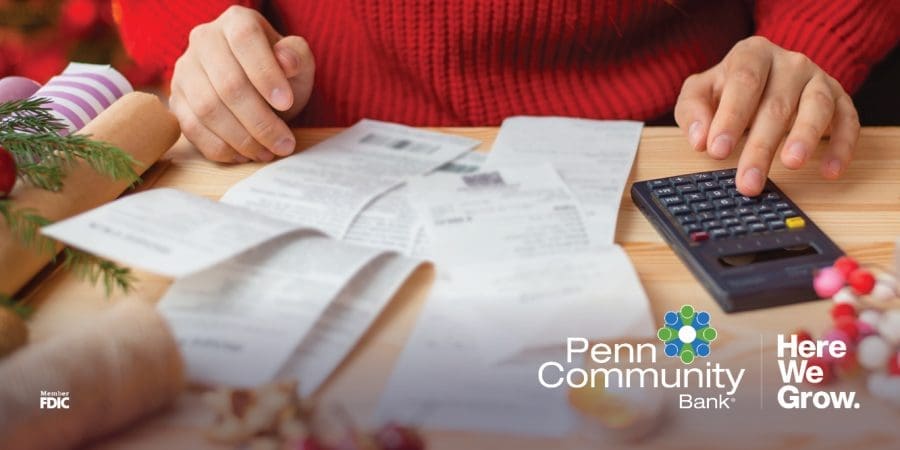
You had a great holiday season. Everyone received the gifts they wanted. Now reality sets in. It’s early in the new year and you open your credit card and bank statements to realize just how much you actually overspent. Often, it’s not the gifts alone that lead to post-holiday financial stress. Other spending on travel, celebrations, and unexpected expenses can stack up quickly.
Suddenly, the stress of repayment crowds in on you.
At Penn Community Bank, we understand. That’s why we propose a budget reset to recover from holiday overspending.
Step 1: Assess the Damage
Don’t panic. Figure out how you overspent on your budget.
- Review Holiday Spending: Look at your bank and credit card statements to calculate how much was spent.
- Identify Areas of Overspending: Categorize expenses to see where you exceeded your budget.
- Check Credit Card Balances: Note interest rates and due dates to prioritize repayment.
- Evaluate Emergency Fund Impact: If holiday spending dipped into savings, consider a plan to rebuild it.
Step 2: Create a Post-Holiday Budget Reset Plan
Once you’ve assessed the damage, make a plan to correct for it.
- Cut Back on Non-Essentials: Reduce discretionary spending on dining out, streaming services, and impulse purchases.
- Rework Your Monthly Budget: Adjust spending categories to focus on debt repayment and savings.
- Prioritize Essentials: Ensure rent/mortgage, utilities, and necessary expenses are covered before discretionary spending.
Step 3: Tackle Debt Strategically
Avoid trying to think you can pay off everything at once. That would lead to more stress. Instead, take a measured approach.
- Consider the Snowball or Avalanche Method:
- Snowball Method: Pay off the smallest debts first for quick wins.
- Avalanche Method: Pay off the highest-interest debts first to save money on interest.
- Look for Balance Transfer or Refinancing Options: Reduce interest rates where possible.
- Make Extra Payments: Use tax refunds, bonuses, or side income to pay down debt faster.
Step 4: Rebuild Your Savings
Give yourself some pad to add to your peace of mind.
- Set Small, Achievable Goals: Start by setting aside a small amount each paycheck.
- Automate Savings: Use automatic transfers to rebuild emergency and long-term savings.
- Take Advantage of High-Yield Savings Accounts: Consider options that earn more interest on savings.
Step 5: Develop Better Financial Habits for the Year Ahead
Don’t plan only on correcting for the previous holiday season’s overspend. Plan to prevent the same thing from happening this year.
- Use a Budgeting App or Spreadsheet: Track expenses and stay accountable.
- Plan Ahead for the Next Holiday Season: Set up a separate holiday savings fund to avoid overspending next year.
- Limit Credit Card Use: Shift more purchases to debit or cash to prevent accumulating debt.
- Look for Ways to Boost Income: Consider side gigs, selling unused items, or picking up extra hours.
A Fresh Financial Start for the New Year
A post-holiday budget detox is a great way to start fresh financially. Rein in your spending by adjusting your budget, strategically tackling debt, and rebuilding your savings. This will help you regain financial stability and set yourself up for success in the new year.
Penn Community Bank is here to help you achieve your financial goals—whether you need a saving strategy, debt repayment advice, or budgeting tips. Contact us or visit a financial center near you to get started!




